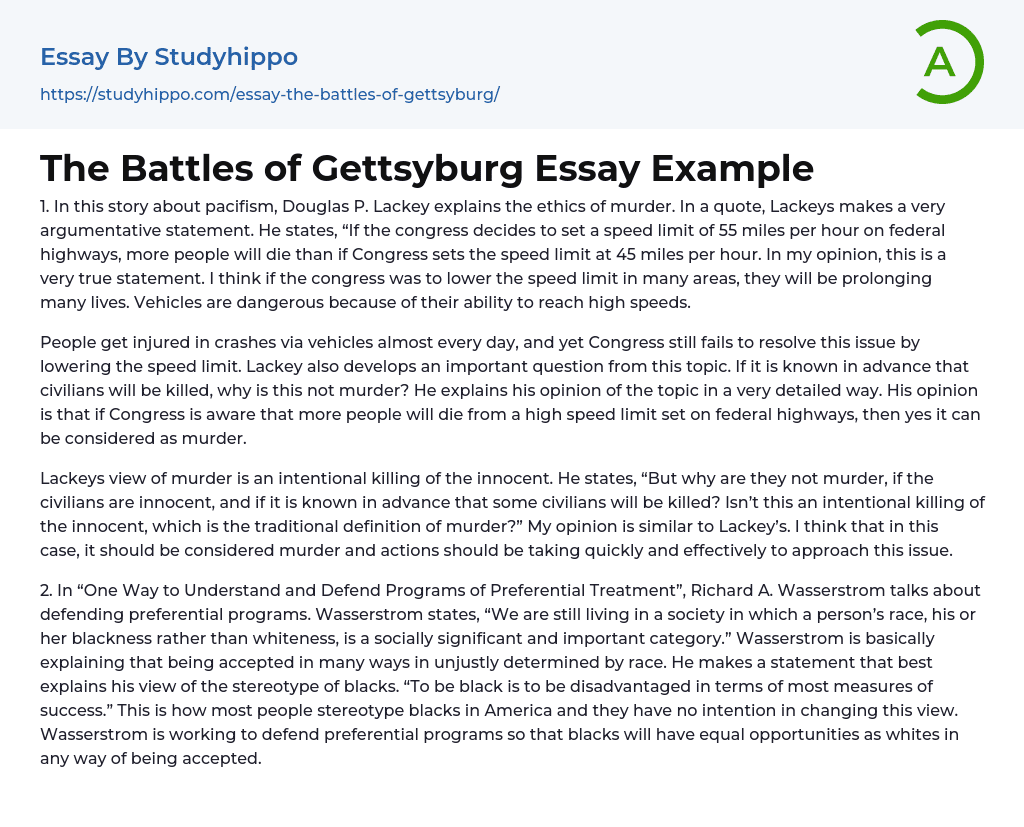Douglas P. Lackey's examination of pacifism ventures into the morality related to killing, presenting an intriguing idea. He proposes that "If the congress decides to implement a speed limit of 55 miles per hour on national highways, it is predicted to lead to more fatalities than if the limit was established at 45 miles per hour." I find this perspective deeply compelling and in accordance with my conviction that lowering speed limits in several regions could possibly prevent many deaths. The main risk associated with cars primarily arises from their capability to achieve high speeds.
Vehicle-related accidents often lead to personal harm, however, it appears that Congress is not giving this problem the necessary consideration by failing to decrease speed limits. Lackey uses this circumstance to raise a significant query - if there's an underst
...anding that harmless lives might be endangered, why is it not viewed as murder? He further explains his perspective in detail. He argues that if Congress consciously accepts that raising speed restrictions on federal roads could potentially cause a rise in death rates, then logically it can be likened to murder.
Lackey's perspective on murder is the deliberate slaying of innocents. He debates, “But why don't they fall under the category of murder if the civilians involved are innocents and it's preknown that some of them will lose their lives? Doesn’t this constitute a purposeful killing of innocent individuals, aligning with the conventional meaning of murder?” I share a parallel viewpoint with Lackey. In my belief, such circumstances ought to be classified as murder and immediate and impactful measures should be adopted to address this problem.
View entire sample
justify;">
2. In his piece "One Way to Understand and Defend Programs of Preferential Treatment," Richard A. Wasserstrom delves into an argument in favor of preferential programs. Wasserstrom articulates, "We continue to exist within a society where an individual's race, specifically their blackness as opposed to whiteness, functions as a significant social and crucial category." In essence, Wasserstrom suggests that acceptance in numerous aspects is unjustly influenced by race. He puts forth a point that impeccably portrays his perception of the stereotyping of blacks, "Being black equates to being disadvantaged when it comes to most success yardsticks." This is the prevalent stereotype of blacks in America and unfortunately, there seems to be no immediate push towards transforming these views. Wasserstrom dedicates his efforts to advocate for preferential programs, aiming for blacks to access the same opportunities as whites in every sense of acceptance.
- Federal government essays
- Armed Forces essays
- Confederate States Of America essays
- Federal Government Of The United States essays
- Fourteenth Amendment To The United States Constitution essays
- Governance essays
- Parliament essays
- Politics essays
- Jurisdiction essays
- Bureaucracy essays
- Separation Of Powers essays
- Congress essays
- President essays
- United States Congress essays
- Non-Commissioned Officer essays
- Appeal essays
- Revenge essays
- Corporate Governance essays
- Public Service essays
- Income Tax essays
- Supply essays
- Red Cross essays
- Democracy essays
- State essays
- Liberty essays
- Absolutism essays
- Reform essays
- Republic essays
- John Marshall essays
- Bourgeoisie essays
- Developed Country essays
- Elections essays
- International Relations essays
- Left-Wing Politics essays
- Monarchy essays
- Political Corruption essays
- Political Party essays
- Political Science essays
- Sovereign State essays
- United Nations essays
- World Trade Organization essays
- Contras essays
- Dictatorship essays
- Foreign policy essays
- Monarch essays
- Corruption essays
- Foreign essays
- Democratic Party essays
- European Union essays
- President Of The United States essays




